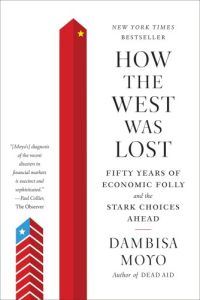Join getAbstract to access the summary!

Join getAbstract to access the summary!
Dambisa Moyo
How the West Was Lost
Fifty Years of Economic Folly – and the Stark Choices Ahead
FSG, 2012
What's inside?
The West did not always dominate the world economically, and its top slot is in contention now.
Recommendation
Many believe the West will always be on top of the world’s economy, as it has been for the past 500 years. However, if the competition for global economic dominance were an upcoming horse race, according to economist Dambisa Moyo’s pessimistic read, Europe would face long odds, America would be even money and China would be the hot favorite. Moyo explains why she believes the US and other Western countries’ financial fortunes are fading, while the smart money is on China, India and the other “Rising Rest” nations as good bets to come up on the outside. While always neutral about political conclusions, getAbstract recommends Moyo’s well-argued – though sometimes feverish – presentation to those interested in considering various scenarios for the global economy’s future.
Summary
About the Author
Dambisa Moyo is an international economist specializing in macroeconomic and global affairs. She is also the author of Dead Aid and appeared on Time’s list of the “100 Most Influential People.”


















Comment on this summary